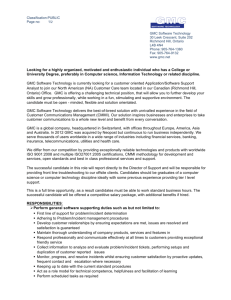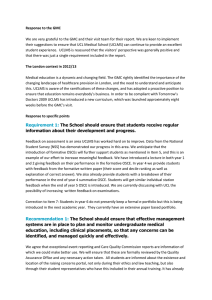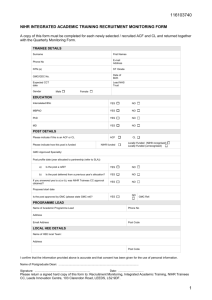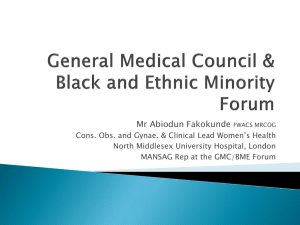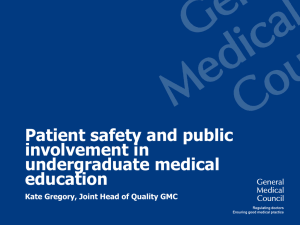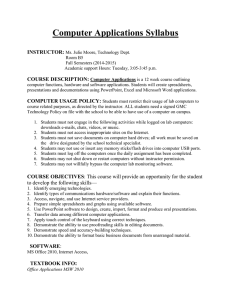www.XtremePapers.com UNIVERSITY OF CAMBRIDGE INTERNATIONAL EXAMINATIONS General Certificate of Education Advanced Level 9707/31
advertisement
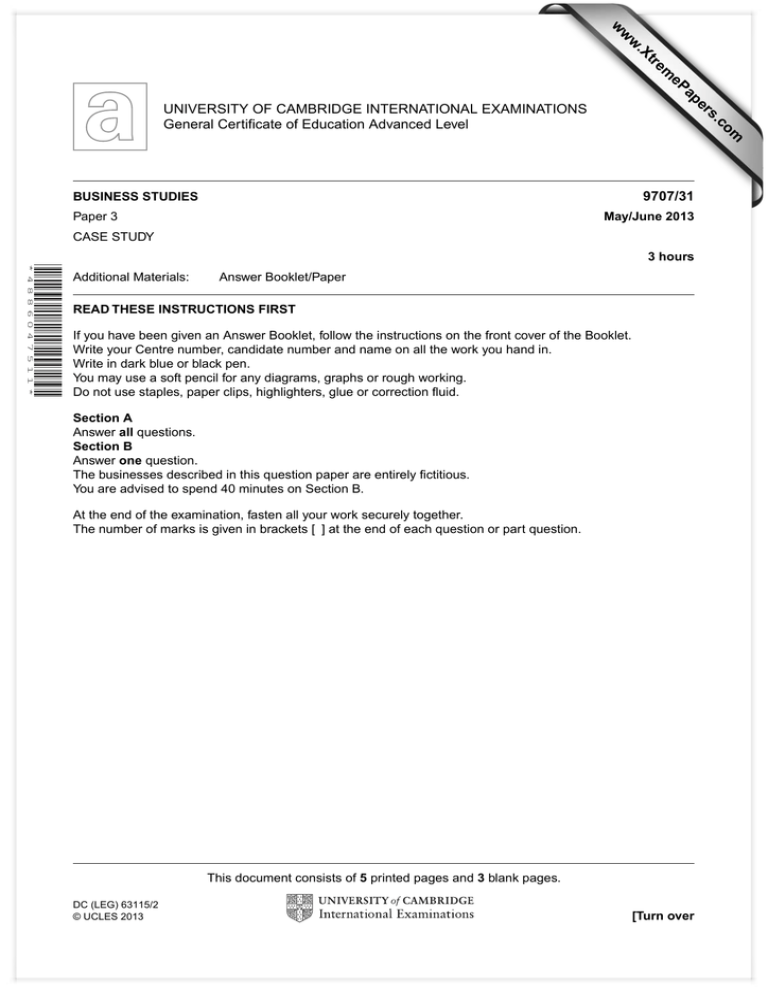
w w ap eP m e tr .X w om .c s er UNIVERSITY OF CAMBRIDGE INTERNATIONAL EXAMINATIONS General Certificate of Education Advanced Level 9707/31 BUSINESS STUDIES Paper 3 May/June 2013 CASE STUDY 3 hours * 4 8 8 6 0 4 7 5 1 1 * Additional Materials: Answer Booklet/Paper READ THESE INSTRUCTIONS FIRST If you have been given an Answer Booklet, follow the instructions on the front cover of the Booklet. Write your Centre number, candidate number and name on all the work you hand in. Write in dark blue or black pen. You may use a soft pencil for any diagrams, graphs or rough working. Do not use staples, paper clips, highlighters, glue or correction fluid. Section A Answer all questions. Section B Answer one question. The businesses described in this question paper are entirely fictitious. You are advised to spend 40 minutes on Section B. At the end of the examination, fasten all your work securely together. The number of marks is given in brackets [ ] at the end of each question or part question. This document consists of 5 printed pages and 3 blank pages. DC (LEG) 63115/2 © UCLES 2013 [Turn over 2 GLOBAL MEDIA CORPORATION (GMC) GMC owns newspapers and television broadcasting operations and provides broadband (Internet) services. It currently operates in 15 countries. The business was formed 30 years ago by the Mendoza brothers, Pablo and Juan, starting a small local newspaper. Some management consultants suggest that the rapid growth of GMC is due to the following three reasons. • Entrepreneurial skills of the Mendoza brothers who still hold a controlling interest in GMC. • Rising consumer incomes in most of the countries in which GMC operates. • Well-timed takeovers by GMC of key competitors. Organisation Structure The organisation structure of GMC is based on divisional decentralisation. There are 3 divisions: • Newspapers • Television channels • Internet services. Senior managers in each division have delegated authority allowing them to take most of the strategic decisions for their division. However, the GMC Board of Directors still controls big capital investment decisions and the company’s corporate responsibility policy. Divisional managers are highly motivated and often display initiative and innovation. They take divisional decisions for each country that reflect the market conditions and culture of each country. However, this form of decentralisation has led to wasteful duplication of support services such as economic forecasting. In addition, there is some conflict between the divisions over, for example, the impact of expanding TV and Internet news services on newspaper sales. Juan, GMC’s Chief Executive Officer, has asked a management consultant to report on the likely effect on GMC of changing to a more centralised organisation structure. Another takeover target? GMC does not currently operate in country Y. GMC directors believe this country has good growth potential. One of the largest media companies in country Y is PPS. This public limited company has received a takeover bid worth $100m from one of GMC’s main global rivals. GMC directors have to decide quickly whether to match or improve on this takeover bid for PPS. ‘Buying PPS would give us rapid entry into country Y markets and also stop the growth plans of our main competitor’ said Juan at the latest Board meeting. Pablo agreed and suggested that GMC should make a takeover bid for PPS as soon as possible. However, the Finance Director suggested: ‘If we make a hurried takeover bid it could mean that we pay too much for PPS. We will also have problems integrating the culture of PPS, which is based on autocratic leadership, into the way GMC does business. We should not make this decision without effective strategic analysis and we should start with the accounting data I have provided for the Board’. (See Appendix 1). Close the Daily Recorder newspaper? Newspaper sales are declining in country Z. Details of recent sales for one of GMC’s newspapers in country Z and other data are contained in Appendix 2. Some GMC directors, especially those whose business experience has been in the TV and Internet divisions, want to close the Daily Recorder. Juan is reluctant to do this as he believes that aggressive advertising of the paper and an Internet version of it could lead to increased sales. © UCLES 2013 9707/31/M/J/13 5 10 15 20 25 30 35 40 45 3 Quality of service Two years ago, GMC launched Internet services in country Z. This is a medium income country but consumer incomes are increasing rapidly. At the time of the launch, GMC’s Internet division decided to operate these services on a low cost basis so that very competitive prices could be offered to customers. Internet speed is set at a low level. There are few staff employed on customer service. The telephone call centre helpline is outsourced to a business in another country with low labour costs. GMC’s staff training costs are kept low, team work is discouraged and workers are given no feedback on performance. In a recent consumer survey, GMC’s Internet services in country Z were given the lowest satisfaction rating of all Internet service providers. The broadband speed, reliability of Internet connection and poor customer service were all heavily criticised. The Head of GMC’s Internet division was reluctant to change the low cost strategy but suggested setting the following three new quality assurance standards. • Average Internet speed to be increased. • Customer telephone enquiries to be answered more quickly. • Complaints over customers’ bills to be handled by supervisors not junior staff. Cell (mobile) phones – a new market opportunity? Always searching for new opportunities, the Mendoza brothers believe that GMC is missing one big product in its portfolio – cell phone services. This is one of the world’s fastest growth industries. Cell phone service providers achieve high profit margins by offering an increasing range of services through technologically advanced phone handsets. Some initial research into this market has been done by GMC and the Mendoza brothers are convinced that entering this market is the best strategy for GMC’s future growth. Some other directors urged the brothers to apply appropriate strategic choice techniques, but Pablo responded by saying: ‘Our entrepreneurial skills have got the company this far – I don’t think they will let us down now’. 50 55 60 65 70 The company is about to develop an appropriate marketing plan for the launch of cell phone services. However, the following key questions still need to be answered. 1. What should the marketing objective be? 2. Should the company aim its cell phone services at a particular market segment? 3. Depending on the answer to question 2 above, what would be the most appropriate promotional activities? 4. Which pricing strategy should be used? 75 According to some industry experts, the continued growth of GMC seems assured with the dynamic leadership of the Mendoza brothers. Other experts are not so sure, believing that a more scientific approach to key strategic decisions will be important to reduce future risks. 80 © UCLES 2013 9707/31/M/J/13 [Turn over 4 Appendix 1: Financial and other data for PPS and GMC As at 31 May 2013: PPS GMC Capital employed ($m) 120 900 See Question 2(a) 15 Dividend yield (%) 3 12 Gearing ratio (%) 65% 32% 80 270 See Question 2(a) 36.5 Return on Capital Employed (% ) Trade receivables ($m) Days’ sales in trade receivables ratio For year ending 31 May 2013: 90 Gross profit ($m) 45 343 Overhead costs ($m) 37.8 208 Revenue ($m) 240 2700 Appendix 2: Data used by GMC directors when considering whether to close the Daily Recorder Price increase of a copy of Daily Recorder – December 2012 Reduction in sales of Daily Recorder – December 2012 Increase in advertising spend on Daily Recorder – May 2013 15% From $60 000 per month to $69 000 3% Estimated income elasticity of demand for daily newspapers 0.2 Daily Recorder total revenue in 2012 ($m) 4.0 Total direct costs of Daily Recorder in 2012 ($m) 3.7 Allocation to Daily Recorder of GMC overheads in 2012 ($m) 1.2 9707/31/M/J/13 95 $0.50 to $0.55 Increase in sales of Daily Recorder – May 2013 © UCLES 2013 85 100 5 Section A Answer all questions in this section. 1 Analyse one advantage and one disadvantage to GMC of changing to a more centralised organisation structure. [10] 2 (a) Refer to Appendix 1. Calculate for PPS: (i) Return on Capital Employed [3] (ii) Days’ sales in trade receivables ratio. [3] (b) Using your results from 2(a) and other information, recommend whether GMC should bid to take over PPS. [12] 3 (a) Refer to Appendix 2. Calculate for the Daily Recorder: (i) price elasticity of demand in December 2012 [3] (ii) advertising elasticity of demand in May 2013. [3] (b) Using your results from 3(a) and other information, discuss whether GMC should close the Daily Recorder. [14] 4 Evaluate whether the new quality assurance standards will be sufficient to improve the quality of Internet services in country Z (lines 54–61). [16] 5 Discuss an appropriate marketing plan for the launch of GMC cell phone services in your country. [16] Section B Answer one question from this section. 6 Evaluate the usefulness of strategic choice techniques that GMC’s directors could use in making the decision whether to enter the cell phone market. [20] 7 Assess the importance to GMC of doing detailed strategic analysis before taking important decisions on future growth strategy. [20] © UCLES 2013 9707/31/M/J/13 6 BLANK PAGE © UCLES 2013 9707/31/M/J/13 7 BLANK PAGE © UCLES 2013 9707/31/M/J/13 8 BLANK PAGE Permission to reproduce items where third-party owned material protected by copyright is included has been sought and cleared where possible. Every reasonable effort has been made by the publisher (UCLES) to trace copyright holders, but if any items requiring clearance have unwittingly been included, the publisher will be pleased to make amends at the earliest possible opportunity. University of Cambridge International Examinations is part of the Cambridge Assessment Group. Cambridge Assessment is the brand name of University of Cambridge Local Examinations Syndicate (UCLES), which is itself a department of the University of Cambridge. © UCLES 2013 9707/31/M/J/13
